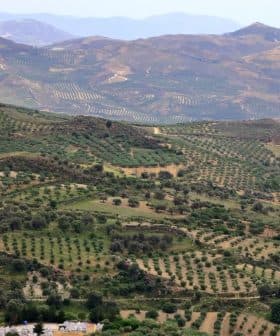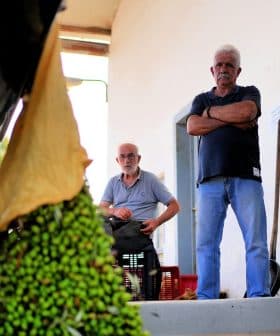Olive Oil Drives Growth of Greek Agri-food Sector
Olive oil was the largest Greek agri-food export last year and the fourth-largest export overall, according to a new report. Its success has renewed the call from farmers for government backing.
 Container port in Piraeus, Athens
Container port in Piraeus, AthensOlive oil is a major driver of the Greek economy, with exports of agricultural and food products totaling €5.43 billion in 2018, showing an increase in value of €117 million specifically for olive oil exports. Despite complaints from growers and producers about lack of government support, the industry aims to increase bottled olive oil exports beyond 50,000 tons in the next two to three years.
Olive oil has always been a significant factor in the Greek economy, and almost every report, study and piece of research on the country’s agricultural sector makes a separate reference to it.
A new report released by the Exporters Association of Northern Greece (SEVE) reviewed and analyzed the export data from 2018, showing that olive oil was the main driving force behind the growth of Greek agri-food exports this year.
We have overtaken the limit of 30,000 tons of bottled olive oil. In two to three years we aim to go beyond 50,000 tons. The dynamics exist and we are positive that we can achieve our goal.
The total exports of agricultural and food products represent 16.2 percent of all the country’s exportable products, and were valued at €5.43 billion ($6.12 billion) compared to €5.08 billion ($5.73 billion) the previous year.
At the same time, exports of virgin and extra virgin olive oil (both bottled and in bulk) peaked at €530 million ($598 million) compared to €413 million ($466 million) the previous season, mainly due to the increased demand from Italy.
See Also:Olive Oil Commerce NewsThis translates to an increased value of €117 million ($132 million) for olive oil in 2018, the highest of any of the country’s agricultural products.
In terms of worth and significance, olive oil is the fourth largest exported Greek product from all sectors, only after petroleum, pharmaceutical products and aluminum commodities.
Despite these large export figures, the performance and the contribution of olive oil to the Greek economy over the years has also sparked complaints from growers and producers, arguing that an important product such as this one should be government-backed.
“Such a wealth-creating product that constantly supports the economy and the local communities gets no support from the government,” Priamos Ieronymakis, director of the Vine and Olive Oil Growers Group of Crete, said.
“The state has never given any European ‘de minimis’ funds to the olive growers and producers of Crete,” he added. “They should give the funds for once. We are talking about €200 million ($226 million) that will really support the Cretan olive groves. Bottlers and exporters also fight to promote our products abroad. This is no easy task.”
Standard olive oil, on the other hand, remains robust in its own right, maintaining a volume of more than 30,000 tons of exports each season during the recent years, compared to only 15,000 tons of exports in the past.
“We have overtaken the limit of 30,000 tons of bottled olive oil,” Grigoris Antoniadis, head of SEVITEL, the association of olive oil bottlers of Greece, said. “In two to three years we aim to go beyond 50,000 tons. The dynamics exist and we are positive that we can achieve our goal. After all, the [international] market and exports of olive oil continuously grow, while the internal market shrinks.”
Even so, the increase in exports of olive oil and other food products in 2018 was not reflected in the penetration of new foreign markets, according to the Association of Greek Industries. Penetration into these markets remained low, due to the fact that world exports are increasing at a higher rate than Greek exports, which are still being affected by the repercussions of the 2008 financial crisis, and can not keep pace with competitors.
As far as the current 2018 – 19 season is concerned, the latest estimates calculate the production of olive oil at only 140,000 tons for the whole country, a lot lower than the expected 200,000 tons.
The next harvest season, however, seems promising, as the agronomist Kostas Lambrinos told Ypaithros newspaper.
“The last season was difficult and the production was severely cut,” he said. “But now the olive trees give us a positive feedback. So, we can call it the year of the olive.”









